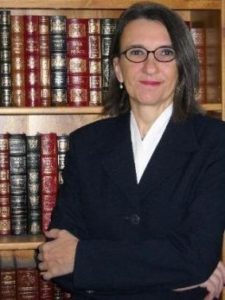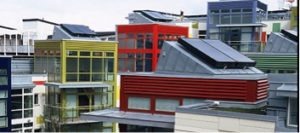

By SILVIA LEAHU-ALUAS, Leaders in Energy, Director – Sustainable Manufacturing
The second conversation of Leaders in Energy without Borders, held in Google Hangout session on February 29, 2016, was a discussion on “Scenarios for a 100% renewable energy global architecture.” Participants explored the idea that the global energy architecture needs a complete shift towards renewable energy in order to achieve the UN Sustainable Development goals, in particular goal # 7, to “ensure access to affordable, reliable, sustainable, and modern energy for all.” The session examined research on how and when the transition to 100% renewable energy could be accomplished and also provided some examples of where this is being accomplished at the local, regional, and global levels.

Janine Finnell, Clean Energy Ambassador and Founder, started with an overview of Leaders in Energy and its ongoing work to build a global community of leaders and professionals. Janine reviewed seven studies, including projections, pathways, and scenarios, on how we can accelerate the transition our society needs to make in order to achieve the objectives identified by the Paris agreement and other national and global targets to move us on the track towards reduced greenhouse gases and ultimately zero emissions. These studies included:
- Tracking Clean Energy Progress, International Energy Agency, 2015
- 100% clean and renewable wind, water, and sunlight (WWS) all-sector
energy roadmaps for the 50 United States, Mark Z. Jacobson et al; Stanford University, 2015 - Deep Pathways to Decarbonization, 2014 & Deep Pathways to Decarbonization in the United States, 2015 Sustainable Development Solutions Network
- New Energy Outlook – Long Term Projections of the Global Energy Sector, Bloomberg New Energy Finance, 2015
- Energy (r)evolution, Greenpeace et al, 2015
- Cost-minimized combinations of wind power, solar power and electrochemical storage, powering the grid up to 99.9% of the time, Corey Budischak et al. , University of Delaware, 2013
- The Net Benefits of Low and No-Carbon Electricity Technologies, Charles R. Frank et al, Global Economy and Development at Brookings Institution, 2014
Silvia Leahu-Aluas argued that despite the cautionary messages about the non-binding nature of current renewable energy commitments in the Paris agreement, and the difficulties many countries have already experienced in moving towards renewable energy, the timeline for a transition to 100% renewable energy global architecture should aim for 2030 as a deadline. Silvia gave a few examples of the many successful projects and actions taken all over the world that, she believes, gives cause for optimism on the likelihood that the world will achieve the 2030 target, as it is the necessary one. These include:
- Iceland is at 100% today (hydro and geothermal)
- Sri Lanka has just announced a 100% renewable energy target for 2030
- Scotland is on track to be 100% renewable energy by 2030
- Costa Rica has a 100% renewable electricity target of 2021
- Fiji has a 100% renewable electricity target of 2030
Commitment to the 100% renewable energy target doesn’t stop at country level. Cities are also integrating ambitious renewable energy goals into their planning. The city of Malmö, Sweden has set targets significantly more ambitious than both the European Union’s (EU) target for Sweden (49% by 2020) and the national plan (50% by 2020). By 2020, Malmö is expected to be climate neutral and have all municipal operations run on 100% RE by 2030.

Adriaan Kamp, Energy for One World Founder and Leaders in Energy member, presented his ideas for a roadmap to organize such a transition at the global level. He reminded listeners about UN Sustainable Development goals and the strong support for them among many organizations and leaders. He argued that it is not analysis or blueprints (the why and how) that we are missing; there are plenty of those available from the best experts in energy technology and policy. Rather, what is missing is a comprehensive plan to manage a complex change of a complex system, the global energy architecture. Despite this, change is happening, as illustrated in some of the examples that were brought up in the discussion.
The session is available on YouTube at: https://youtu.be/X61p1UN6-zk
The slides from the session are also available: Scenarios for a 100% Renewable Energy Global Architecture.
We would be delighted to answer your questions and comments related to our conversations and welcome suggestions for topics of interest to our global audience.
Our next conversation is scheduled for April 2016. Additional details on how to participate will be forthcoming on our Leaders in Energy website.
+++++++++++++++
Leaders in Energy is a professional educational, networking and advisory services organization. Its mission is to build a community to leaders to enable solutions for a more sustainable energy system, economy, and world. It holds monthly events in the Washington DC area and its LinkedIn group, “Leaders in Energy Research, Communications, Policies & Analysis” ( LERCPA) has 2000+ members from around the US and world. We invite you to join our LinkedIn group and visit our website (See “Join our Leaders in Energy Community”) to obtain information regarding our mission and activities.
About “Leaders in Energy Without Borders”: Janine Finnell, Adriaan Kamp, and Silvia Leahu-Aluas, three sustainability and energy professionals and members of Leaders in Energy, have started a series of global conversations focusing on the path towards sustainable energy, in particular, and sustainable development, in general. The topic of our first conversation was “Values, Collaboration, Technology for Sustainable Global Energy.”


Leave a Reply